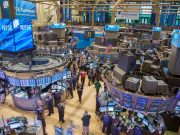Netflix just did something that only the most dominant companies in history dare to do.
They announced a 10-for-1 stock split.
Now, I know what you’re thinking. “Stock splits don’t create value. They’re just accounting gimmicks.” And you’re right. Technically.
But here’s what Wall Street won’t tell you: Stock splits are victory laps. They’re what companies do when they’ve won so decisively that they need to make their shares more “accessible” to regular investors.
And Netflix? They’ve won. Completely. Utterly. Decisively.
Since going public in 2002, Netflix shares have exploded 94,310%. That’s not a typo. Ninety-four thousand percent.
Put another way: A $10,000 investment at the IPO would be worth $9.4 million today.
But here’s the shocking part: The gains aren’t over. Not even close.
The Streaming Monopoly Nobody Saw Coming
Let me tell you a story about disruption.
In 2007, Netflix launched something called “Watch Now.” It was buggy. The selection was terrible. Critics laughed.
Blockbuster, then worth billions, called it a “niche business.” The CEO literally said Netflix wasn’t “even on the radar screen.”
Today, Blockbuster is dead. And Netflix? It’s worth over $500 billion.
But here’s what’s really extraordinary: Netflix didn’t just kill Blockbuster. They killed cable television. They transformed how 270 million people around the world consume entertainment. And they’re just getting started.
The Numbers That Should Terrify Netflix’s Competitors
Let me share some numbers that Wall Street is desperately trying to ignore:
Third quarter 2025 results:
- Revenue: $11.5 billion, up 17% year over year
- Adjusted earnings per share: $6.87 (excluding one-time charges), up 27%
- Free cash flow: Billions (yes, with a B)
But here’s the kicker – their fourth quarter guidance. They’re projecting revenue of $11.96 billion, with earnings per share growing 28%.
Think about that. A company with a half-trillion market cap is still growing earnings at nearly 30%.
That doesn’t happen. Except when you have a monopoly.
The Real Reason Wall Street Is Panicking
Editor’s Note: One of the biggest stock market events in 25 years is rapidly unfolding… The economist who predicted the 2008 Financial Crisis says it will be: “The Biggest Crash of Our Lifetime.” Cutting the entire tech market by HALF – virtually overnight. This is why the world’s financial elite are panic-selling stocks at the fastest rate in a decade. [Full Story…]
You want to know why 33 out of 49 Wall Street analysts have buy ratings on Netflix? Why none – ZERO – recommend selling?
Because they finally understand what I’ve been telling my readers for years: Netflix isn’t a streaming company. It’s a content empire.
They just announced “unprecedented licensing partnerships” with Hasbro and Mattel. Their movie “KPop Demon Hunters” became the most popular Netflix film of all time. The soundtrack hit No. 1 on the Billboard 200.
Netflix is becoming Disney. But better. Faster. More global.
And here’s the part that should make you sit up straight: They’re expanding into video games. Not just licensing games. Creating them. Distributing them. Owning the entire ecosystem.
The Hidden Catalyst That Could Double the Stock
Pivotal Research analyst Jeffrey Wlodarczak – one of the few analysts on Wall Street I actually respect – has a $1,600 price target on Netflix. That’s 47% upside from current levels.
But I think he’s being conservative.
Why? Because Netflix is still “underpenetrated globally.” Read that again. A company with 270 million subscribers is underpenetrated.
There are 8 billion people on this planet. Even if only half have internet access capable of streaming, that’s 4 billion potential customers. Netflix has captured less than 7% of them.
The growth runway isn’t just long. It’s infinite.
The Valuation Trap That’s Fooling Amateur Investors
“But Tom,” you’re thinking, “Netflix trades at 47 times earnings! That’s insane!”
You’re right. It is expensive. By traditional metrics.
But let me ask you something: Would you have refused to buy Microsoft in 1995 because it was “expensive”? Would you have passed on Amazon in 2005 because the PE ratio was “too high”?
Over the past 10 years, Netflix has returned 939%. The S&P 500? A measly 229%.
That “expensive” stock has outperformed the market by more than 4-to-1.
And with this stock split, they’re telegraphing something important: The party isn’t over. It’s just beginning.
My Verdict: Buy Before the Split
Here’s what’s going to happen.
The stock split will make Netflix shares more “affordable” to retail investors. Instead of paying $1,100 for one share, they’ll pay $110 for one share.
Psychologically, that matters. A lot.
More buyers will flood in. The stock will surge. And those who bought before the split will look like geniuses.
But here’s the real reason to buy Netflix: They’ve won the streaming wars. Completely.
Disney+ is bleeding money. HBO Max is a disaster. Apple TV+ is a rounding error. Amazon Prime Video is an afterthought.
Netflix is the only streaming service that matters. The only one making real money. The only one with true global scale.
The Bottom Line
Netflix at $1,100 per share (pre-split) isn’t cheap. But dominant monopolies never are.
This is a company that transformed from mailing DVDs to controlling how the world watches entertainment. They generate billions in free cash flow. They’re growing at 30%. And they’re just beginning to monetize their 270 million subscriber base.
Wall Street’s average price target is $1,347. That’s 24% upside. But the highest target is $1,600. That’s 47% upside.
I think both are too conservative.
When the history of the 21st century is written, Netflix will be remembered as one of the companies that changed everything. Like Microsoft in the 90s. Like Google in the 2000s. Like Apple in the 2010s.
The stock split is your invitation to join the party. I suggest you RSVP “yes.”
Good investing,
Tom Anderson
Editor, Wall Street Watchdogs
P.S. There’s another reason Netflix is about to explode higher that nobody’s talking about. They’re sitting on the most valuable data set in entertainment history – the viewing habits of 270 million people. When they fully monetize that data through advertising and AI-driven content creation, this stock won’t be trading at $1,100. It’ll be trading at $3,000. The split is happening now for a reason. Don’t miss it.
Disclaimer: This article is for informational purposes only and should not be considered personalized investment advice. Past performance does not guarantee future results. Please conduct your own research before making investment decisions.











